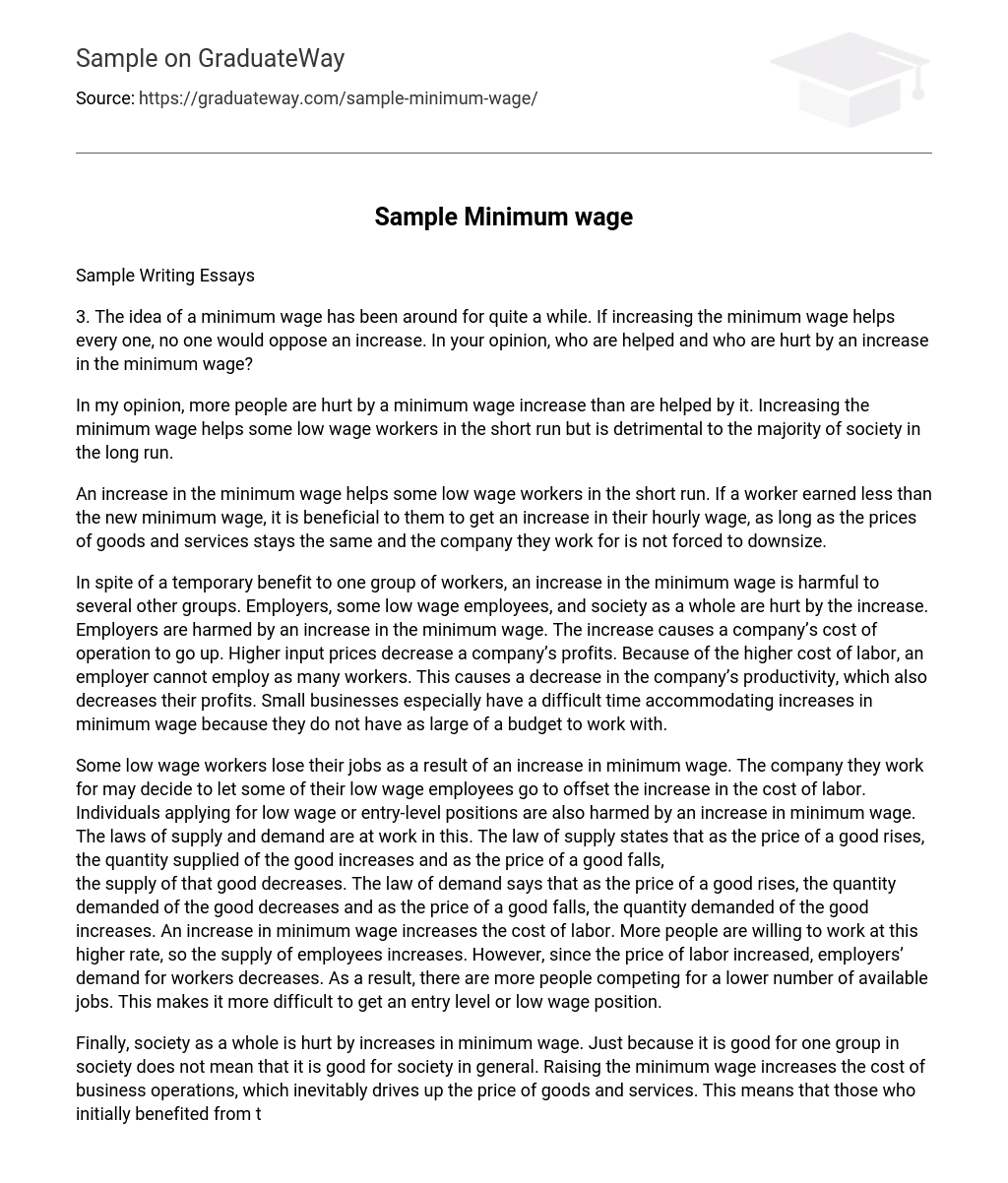Sample Writing Essays
3. The idea of a minimum wage has been around for quite a while. If increasing the minimum wage helps every one, no one would oppose an increase. In your opinion, who are helped and who are hurt by an increase in the minimum wage?
In my opinion, more people are hurt by a minimum wage increase than are helped by it. Increasing the minimum wage helps some low wage workers in the short run but is detrimental to the majority of society in the long run.
An increase in the minimum wage helps some low wage workers in the short run. If a worker earned less than the new minimum wage, it is beneficial to them to get an increase in their hourly wage, as long as the prices of goods and services stays the same and the company they work for is not forced to downsize.
In spite of a temporary benefit to one group of workers, an increase in the minimum wage is harmful to several other groups. Employers, some low wage employees, and society as a whole are hurt by the increase. Employers are harmed by an increase in the minimum wage. The increase causes a company’s cost of operation to go up. Higher input prices decrease a company’s profits. Because of the higher cost of labor, an employer cannot employ as many workers. This causes a decrease in the company’s productivity, which also decreases their profits. Small businesses especially have a difficult time accommodating increases in minimum wage because they do not have as large of a budget to work with.
Some low wage workers lose their jobs as a result of an increase in minimum wage. The company they work for may decide to let some of their low wage employees go to offset the increase in the cost of labor. Individuals applying for low wage or entry-level positions are also harmed by an increase in minimum wage. The laws of supply and demand are at work in this. The law of supply states that as the price of a good rises, the quantity supplied of the good increases and as the price of a good falls,
the supply of that good decreases. The law of demand says that as the price of a good rises, the quantity demanded of the good decreases and as the price of a good falls, the quantity demanded of the good increases. An increase in minimum wage increases the cost of labor. More people are willing to work at this higher rate, so the supply of employees increases. However, since the price of labor increased, employers’ demand for workers decreases. As a result, there are more people competing for a lower number of available jobs. This makes it more difficult to get an entry level or low wage position.
Finally, society as a whole is hurt by increases in minimum wage. Just because it is good for one group in society does not mean that it is good for society in general. Raising the minimum wage increases the cost of business operations, which inevitably drives up the price of goods and services. This means that those who initially benefited from the increase in minimum wage are not any better off than before and those whose wages were not affected by the increase now have a lower standard of living because it takes more money to buy the same things. Minimum wage is essentially a price floor, which is an artificial constraint placed on the economy and often results in a surplus. In the case of minimum wage, the supply of workers is greater than the demand for workers. Raising the minimum wage drives up inflation and results in higher prices and cost of living until another increase is necessary – then the cycle starts again.
5. “Morgan Stanley posted a $3.59 billion loss, its first quarterly loss in 21 years, amid a $9.4 billion write-down on its mortgage assets. The losses, which CEO Mack called ‘embarrassing,’ came as the firm got a $5 billion investment from a Chinese fund in exchange for a 9.9% stake. Shares rose 4%. Chinese buyers spent $29.2 billion acquiring foreign companies so far this year, outpacing for the first time foreign buyers that have invested in China.” (Wall Street Journal, 12/07, p. A1) What type of thesis research might you conduct within your own major to examine some of the dynamics at play described in this Wall Street Journal article?
My thesis research would deal with the impact of Chinese investments in
foreign companies outpacing foreign investments in China on the world economy. More specifically, the thesis research would focus on how this increase in Chinese investment has affected their business relations with the United States. Does foreign investment strengthen economic ties between the two nations? For background, I would investigate and explain the nature of the foreign investment market to gain a general understanding of how it works. In addition, the research would explore what factors have caused China’s foreign investments to increase. Also, I would like to determine whether China invested in American companies more than America invested in Chinese companies in 2007 and how that has impacted their respective economies. In this research it would be interesting to determine what American industries China was investing in.





